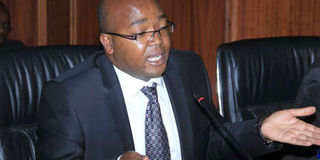Health scandal shows how deep the corruption roots have gone

Health Principal Secretary Nicholas Muraguri speaks before the National Assembly Health Committee on November 3, 2016 regarding graft claims in the Ministry. Mr Uhuru Kenyatta neither has the political will, stamina nor credentials to fight corruption. PHOTO | JEFF ANGOTE | NATION MEDIA GROUP
What you need to know:
- Tenderpreneurs take no risks given that they already know how much they will be paid, and when.
- Questions about why now, or whether these are diversionary tactics are irrelevant and a shallow way to defend the indefensible.
Let’s get this straight: the current version of tenderpreneurs wreaking havoc on the poor, the weak, the sick and the marginalised are neither entrepreneurs nor businesspeople.
They are hustlers who peddle influence. In fact, they are simple brokers, in the very Kenyan sense of the term.
An entrepreneur is someone who takes considerable risks to make profits, and who has as much chance to make losses as profits.
Tenderpreneurs take no risks given that they already know how much they will be paid, and when.
All they have to do is source the commodity for which they receive the tender, often paying the suppliers only once our tax money has been paid to them.
This, incidentally, is pretty much how much of Anglo Leasing was done.
In normal civilised society, the most important qualification for getting tenders is that a company has considerable experience in the business for which the tender is sought, with all the ups and downs that the particular line of business entails.
Tenders are not, in civilised societies, issued to shell companies, or to companies whose first business is “bidding” for tenders as brokers.
What we have seen this past year with NYS and now Mafya House is hustling and influence peddling, no matter the gloss put on it.
And it hurts and costs Kenyans, no matter what any CS or PS may say, because it proves that Kenya is for a few powerful with connections, not for the majority.
And this will drive us back down the slippery slope.
Sometimes tenders can be earmarked for under-privileged and marginalised communities to rectify historical injustices, but with strict guidelines.
One’s gender alone, for instance, is not, cannot, and must never be the sole definer of who is marginalised.
So no matter how you slice it, Kathleen Kihanya’s Sundale International Limited can never be termed marginalised or under-privileged.
NO POLITICAL WILL
What this Mafya House scandal has revealed is that we really have no inkling of how widespread and politicised this hustling and broking by tenderpreneurs is.
Which other gravy train ministries could have been affected these past years?
What would we find if we allowed Auditor-General Edward Ouko to do a proper audit of the ministries of Defence, Interior, Energy, Agriculture and Mining?
Or at the secretive National Intelligence Service, whose accounts are never publicly available, even over non-confidential expenses. The mind boggles!
In fact, what this scandal has done is to burst the well-dispersed myth that one side of the Jubilee coalition is greedier than the other.
Clearly, they both are eating like no one’s business.
And clearly, Mr Uhuru Kenyatta neither has the political will, stamina nor credentials to fight corruption.
Because, even if the tenders were ‘legal,’ they are not legitimate.
How any one person and company can scoop up so many tenders tells a story of possible kickbacks or efforts to please those perceived to be close to power by those awarding tenders.
And that is corruption.
The fight-back by Jubilee after the exposure of this Mafya House scandal speaks volumes.
This is not about Raila Odinga or politics.
ECONOMIC GROWTH
This is simply about doing a proper accounting, shedding full light on those who have benefited from these tenders, and why they were chosen, even when their companies were set up purely for the purpose of getting tenders wherever and however.
Questions about why now, or whether these are diversionary tactics are irrelevant and a shallow way to defend the indefensible.
It does not matter if this was yesterday, next year or next month: let us deal with the scandal before us, even as we add up and remember all the other ones that have surfaced over the last few years.
Perhaps these scandals explain the mystery of how the economy can be ostensibly growing at five per cent plus per year, yet what we see is joblessness, companies in serious trouble and downsizing, and inflation biting us — at least the majority that are not hustler tenderpreneurs.
Or maybe they are just cooking the books, which given the level of corruption and lack of integrity would not be a surprise.
After all, remember the ‘typing error’ from the national budget presented in 2009 by… oops... Mr Kenyatta himself?





